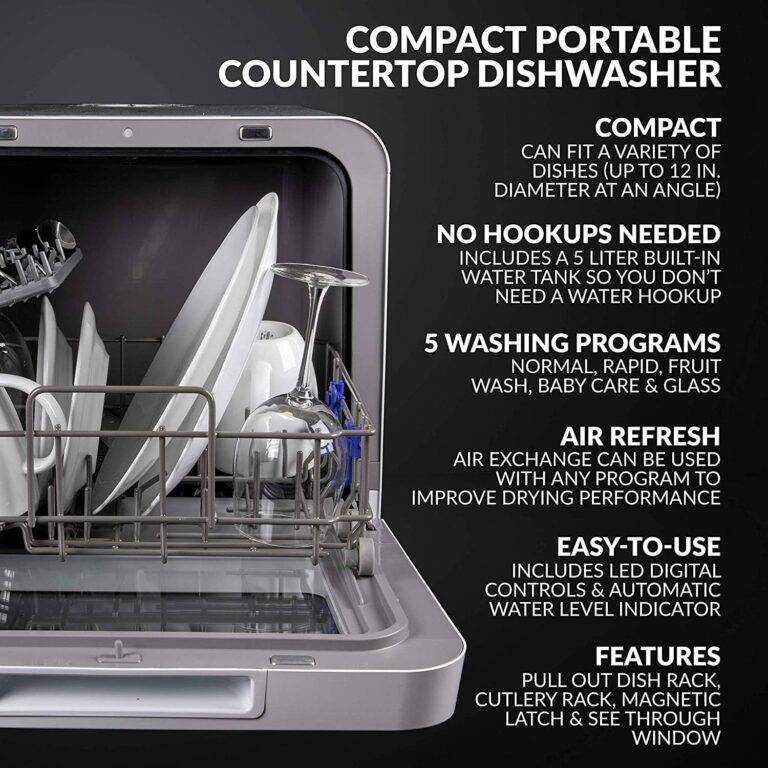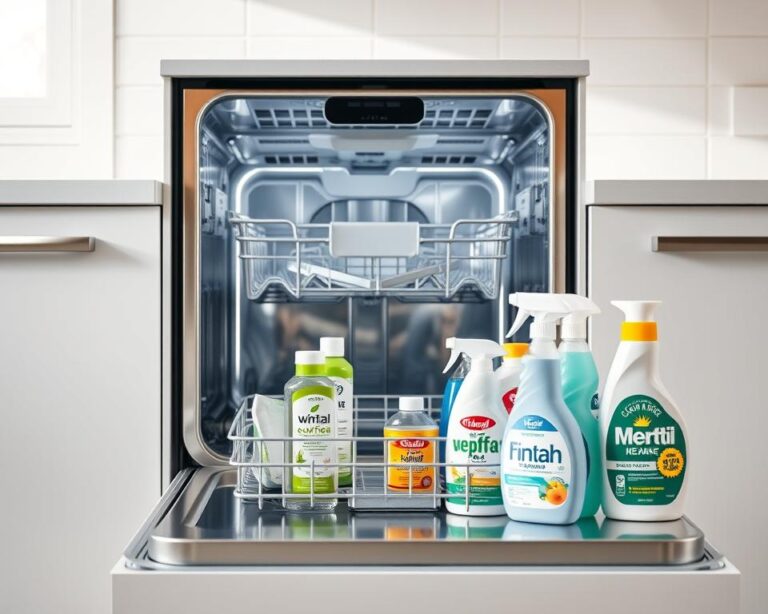Is your dishwasher struggling to maintain its shine and efficiency? Regular upkeep is crucial for optimal performance, and the best way to clean your dishwasher naturally is by using common household items like vinegar and baking soda. Experts recommend cleaning your dishwasher once a month to maintain sanitation and efficiency, ensuring that it operates at its best while prolonging its life12. This simple DIY dishwasher cleaner not only eliminates odors but also combats unwanted residue such as grease, limescale, and grime2. With a friendly approach to home care, your dishwasher can gleam and function like new, so let’s dive into this effective and eco-friendly cleaning method!
Why Is It Important to Clean Your Dishwasher?
Maintaining a clean dishwasher is vital for efficiency and longevity. Regular cleaning helps to prevent unwanted residue like minerals, grease, grime, and limescale buildup inside the unit, which can lead to costly repairs3. Experts recommend giving your dishwasher a vinegar treatment about once a month, as this ensures grime, limescale, and odors are dealt with swiftly4. A dirty dishwasher can accumulate food particles and residues, fostering bacteria and mold growth that can compromise hygiene during cycles.
The benefits of a clean dishwasher extend beyond just cleanliness. Cleaning not only maintains appliance hygiene but also helps preserve dish cleanliness during cycles4. It is advised to clean the dishwasher when it is empty, allowing the vinegar to penetrate all areas effectively without damage to sensitive parts4. Using white vinegar as a natural cleaner can keep your dishwasher running smoothly, and it is suggested to run the dishwasher with one cup of white vinegar during the hottest cycle to enhance cleaning3. Ensuring regular maintenance can prevent unpleasant odors and keep your dishwasher performing at its best.
Signs Your Dishwasher Needs Cleaning
Recognizing the signs of a dirty dishwasher is essential for maintaining its efficiency. Smelly odors when opening the door are often a first indication that your dishwasher requires cleaning5. Other obvious signs include visible food debris accumulating at the bottom, which can result from not pre-rinsing dishes before loading6. Additionally, if you notice grime build-up on the door seals or if the spray arms appear clogged, it’s time for a thorough clean5. Dishes coming out with residue or food particles stuck to them signal that your dishwasher might not be effectively cleaning7.
Regular maintenance is key to preventing these issues. Experts suggest that cleaning your dishwasher at least once a month is vital for optimal performance and reducing build-up of mold and mildew6. Leaving the door open slightly after cycles allows moisture to escape, further preventing unpleasant odors6. Following practical dishwasher cleaning tips helps ensure that your appliance remains in peak condition, reducing the likelihood of foul smells and ineffective cleaning.
Gather Your Cleaning Materials
Before diving into the cleaning process, it is essential to gather all necessary materials to ensure efficiency and effectiveness. Key dishwasher cleaning materials include distilled white vinegar and baking soda, which play a critical role in maintaining cleanliness. Prepare a soft bristle brush and an old toothbrush for scrubbing hard-to-reach places. A microfiber cloth will help with drying and polishing surfaces. For intricate cleaning tasks, optional toothpicks can assist in dislodging debris.
The recommended amount of white vinegar for an effective cleaning process is 2 cups, while 1 cup of baking soda is effective for removing unwanted odors8. Having these natural cleaning supplies readily available will streamline your cleaning efforts. Deep cleaning is not required daily; a thorough cleaning should be conducted once a month8. The time commitment for this monthly thorough clean can vary from 20 to 30 minutes, making it a manageable task9.
Following this preparation, you can ensure that your dishwasher functions efficiently and maintains a hygienic kitchen environment. Regular usage of vinegar and baking soda contributes to a longer lifespan for your appliance9, while the natural solutions effectively dissolve grease and eliminate mineral deposits10. With the right dishwasher cleaning materials in hand, you are fully equipped to proceed with the cleaning process.
Step-by-Step Guide to Clean Your Dishwasher
Starting with step-by-step dishwasher cleaning, the first action is to remove all dishes and utensils from your dishwasher. Ensuring the area is clear helps you access the interior effectively.
Next, check the drain at the bottom of the dishwasher and remove any debris that may hinder water flow. This small but critical step can significantly improve your dishwasher’s performance.
Follow this by using a cup of white vinegar, placing it on the top rack, and running a hot water cycle. This vinegar method helps dissolve mineral deposits and clears away grease buildup, making it an essential part of how to clean dishwasher effectively11.
After the vinegar cycle, sprinkle baking soda on the bottom of the dishwasher. Running another hot water cycle at this stage aids in removing any remaining grime and odor11. This simple method utilizing vinegar and baking soda not only freshens your appliance but also leaves dishes spot-free.
For more persistent stains, consider adding bleach to the bottom of the dishwasher before a full cycle, but be cautious with stainless steel interiors11. Remember, regular maintenance such as cleaning the filter weekly and pre-scraping dishes assists in maintaining cleanliness.
Cleaning your dishwasher every two to three months is generally recommended to keep up with mineral deposits and food particles1213. By following this step-by-step approach, you can ensure your dishwasher remains in optimal condition and operates efficiently.
How to Clean Dishwasher with Vinegar and Baking Soda
Using the vinegar baking soda cleaning method offers an effective approach to maintain your dishwasher. Experts recommend cleaning your dishwasher once a month to keep it sanitary and efficient14. The acidity of white vinegar works wonders in breaking down grease and food particles that accumulate in various areas, such as the drain and spray arms, preventing mold and bacteria growth14. After running a cycle with vinegar, adding baking soda helps neutralize any lingering odors, ensuring your appliance is fresh and ready for use.
To clean your dishwasher, start by removing the bottom rack and inspecting the drain for any food debris. Prepare the cleaning solution by heating one cup of white vinegar with two tablespoons of baking soda, then pour it into the drain15. Let this mixture sit for 10 to 15 minutes to allow the ingredients to work their magic. After this, run a hot water cycle to flush out the residue.
It is important to follow proper dilution steps, especially when cleaning rubber gaskets with vinegar, to prevent damage. Regular checks of utensil holders and filters, along with maintaining the dishwasher door open after each cycle, can help avoid mold and mildew buildup14. Consider this cleaning method essential not only for optimal performance but also for extending your machine’s lifespan.
If you seek a comprehensive guide on improving the cleaning process, check out Best Detergent for expert advice and resources.
Cleaning the Dishwasher Filter
Cleaning the dishwasher filter is an essential part of maintaining your appliance. Experts recommend how to clean dishwasher filter once a month to keep the dishwasher in optimal condition16. For models with manual filters, it’s vital to remove and clean them periodically17. Begin by soaking the filter in warm, soapy water for about 20 minutes, which helps to loosen any stubborn debris17. After soaking, gently scrub it with a brush to ensure all food particles are cleared away16. Rinse thoroughly to eliminate soap residues before reattaching the filter for effective dishwashing17. Regular cleaning helps prevent odors and the build-up of mold and bacteria in the dishwasher1618, promoting better dishwasher maintenance.
Cleaning the Inside of the Dishwasher
Regular interior dishwasher cleaning is essential for maintaining a hygienic and efficient appliance. A study revealed that 70% of dishwashers were found to contain yeast, while 10% of them had fungi, indicating the presence of health-threatening microorganisms18. Utilizing vinegar for cleaning inside the dishwasher can effectively combat these microorganisms, as it has been proven to kill 82% of molds18. When cleaning, focus on the spray arms and rubber seals, as food buildup in these areas can hinder functionality and may contribute to the growth of bacteria19.
After applying vinegar and baking soda, additional wiping with a microfiber cloth can enhance the shine and cleanliness of the interior surfaces. Remember to perform this cleaning method every 3-4 months to prevent the accumulation of grime and mold19. Ignoring the interior cleaning can lead to biofilm caused by bacteria like Serratia marcescens, which can be challenging to remove. It is also advisable to hand wash the dishwasher filter monthly with hot water and dish soap to avoid odor buildup and maintain overall performance18. Regular maintenance not only improves cleaning efficacy but also prolongs the lifespan of the appliance.
Regular Maintenance Tips for Your Dishwasher
Regular maintenance tips for your dishwasher can greatly improve its longevity and performance. Scrape food residue from plates, silverware, and bowls before loading to prevent leftover food from causing foul odors at the bottom of the machine20. Monthly cleaning is essential; running a cycle with one cup of white vinegar can enhance effectiveness and eliminate odors2122. In addition, cleaning the dishwasher filter every few weeks helps maintain cleanliness and efficiency22. Baking soda can be used to deodorize the appliance, but should not be mixed with vinegar during cleaning2122. Make sure to check rubber gaskets for wear and tear periodically, as this part can accumulate grime21.
For those utilizing their dishwasher less frequently, thorough cleaning still shouldn’t exceed six months21. If you notice unpleasant odors, clean the drain trap and consider running a rinse-only cycle when not washing a full load20. Maintaining a consistent cleaning routine not only keeps your dishwasher sparkling but also ensures optimal functioning for years to come.
Eco-Friendly Benefits of Homemade Dishwasher Cleaners
Embracing eco-friendly dishwasher cleaning methods can significantly enhance your home’s sustainability. Homemade dishwasher detergent, made from natural ingredients like washing soda, borax, kosher salt, and citric acid, costs less than a penny per load to make, making it a cost-effective solution for maintaining cleanliness23. This recipe yields approximately 50 loads of dishes for just 50 cents, highlighting its affordability and effectiveness23.
Using a natural dishwasher cleaner avoids the harmful chemicals often found in commercial products. In many cases, these commercial detergents contain phosphates and synthetic fragrances that can have detrimental effects on aquatic ecosystems24. By opting for homemade solutions, you not only reduce chemical exposure in your home but also minimize your impact on the environment.
Natural acids such as citric acid and vinegar are essential components of these homemade cleaners due to their cleaning and degreasing properties24. For optimal results, adding vinegar to the rinse dispenser ensures grease-free and shiny dishes, reinforcing the benefits of eco-friendly dishwasher cleaning methods.
Moreover, households can feel confident knowing that ingredients like baking soda and kosher salt are biodegradable and non-toxic, providing effective cleaning without the residue buildup common with harsher chemicals24. With ongoing support for green living practices, making your own dishwasher cleaner is a straightforward way to maintain a healthy and eco-conscious household. For those preferring a premade option, commercial eco-friendly dishwasher detergents can provide a viable alternative, ensuring cleaner dishes without compromising environmental principles natural dishwasher cleaner.
Common Mistakes When Cleaning a Dishwasher
Many homeowners overlook common dishwasher cleaning mistakes that can impede optimal performance. Cleaning the dishwasher is essential, and it’s advised to aim for a monthly cleaning schedule to prevent buildup of particles and maintain efficiency2526. One frequent error is neglecting to clean the filter regularly, which can lead to unpleasant odors and inadequate cleaning results. Letting the filter soak for 15 to 30 minutes in a mixture of hot water and distilled white vinegar can significantly improve its effectiveness25. Another common mistake involves using harsh ingredients on the gasket; acidic cleaners can degrade the rubber parts, leading to leaks2526.
It’s vital to remove dishes before running a cleaning cycle. Running the dishwasher empty with a container of vinegar on the top rack helps eliminate lingering smells26. Failing to clean the drain and spray arms can cause persistent buildup and malfunctions, reinforcing the importance of regular maintenance. If you encounter tough stains on the walls, a paste made from baking soda and water can be useful; apply it for ten minutes before rinsing25. Lastly, keeping the dishwasher door slightly ajar after each cycle prevents mold growth due to moisture accumulation. Awareness of these dishwasher cleaning errors is crucial for achieving a clean and well-functioning appliance.
Additional Tips for a Sparkling Dishwasher
For enhancing dishwasher cleanliness, consider leaving the door slightly ajar after each wash. This simple step allows moisture to escape, significantly reducing the likelihood of mold growth. Furthermore, regularly inspect the inside of the dishwasher for trapped food and debris after each cycle to prevent unpleasant odors and maintain overall hygiene.
Amanda Poole from The Home Depot advises thoroughly cleaning your dishwasher every month, but it’s important not to let more than six months pass without a deep clean27. Regularly cleaning the dishwasher filter ensures longer-lasting cleanliness27, and a quick pre-rinse of dishes prior to loading them can greatly extend the cleanliness of your appliance.
Utilizing vinegar and baking soda in your routine can work wonders. To clean parts effectively, soak them in a solution of two cups of vinegar in warm water for 20 minutes27. To tackle mold or mildew, use a mixture of half a cup of vinegar and three cups of hot water, applying it with a toothbrush27. Overall, making these small adjustments can lead to a sparkling dishwasher you’ll be proud to use!

FAQ
How often should I clean my dishwasher?
It’s recommended to clean your dishwasher at least once a month to prevent odors and ensure efficient operation.
What household items can I use to clean my dishwasher?
You can effectively clean your dishwasher using common household items like distilled white vinegar and baking soda.
Can I use vinegar directly on the rubber gaskets?
Yes, but be cautious to dilute it properly. Too much vinegar may damage the rubber gaskets, so it’s essential to clean with care.
What should I do if my dishwasher smells bad?
If your dishwasher has a foul odor, try running a cleaning cycle with vinegar followed by baking soda. This can help eliminate odors and grime.
Do I need to remove the filter to clean my dishwasher?
Yes, if your dishwasher has a removable filter, it’s vital to take it out and clean it regularly for optimal performance.
Is cleaning my dishwasher with vinegar and baking soda safe?
Absolutely! This eco-friendly method is safe for both your appliance and the environment, making it a great choice for natural dishwasher cleaning.
What happens if I don’t clean my dishwasher regularly?
Neglecting to clean your dishwasher can lead to bacteria and mold growth, blocked spray arms, and less effective washing, resulting in dirty dishes.
Should I leave the dishwasher door open after cleaning?
Yes, leaving the door ajar after each cycle allows for proper drying, helping to prevent mold and mildew growth inside the dishwasher.
What’s the best way to tackle tough stains inside the dishwasher?
Utilize vinegar for deep cleaning cycles to break down tough stains and food residues. Following up with a scrub and a microfiber cloth gives a polished finish.
Can I use other natural ingredients for cleaning my dishwasher?
Besides vinegar and baking soda, you can use lemons or citric acid for additional cleaning power and pleasant scents.



